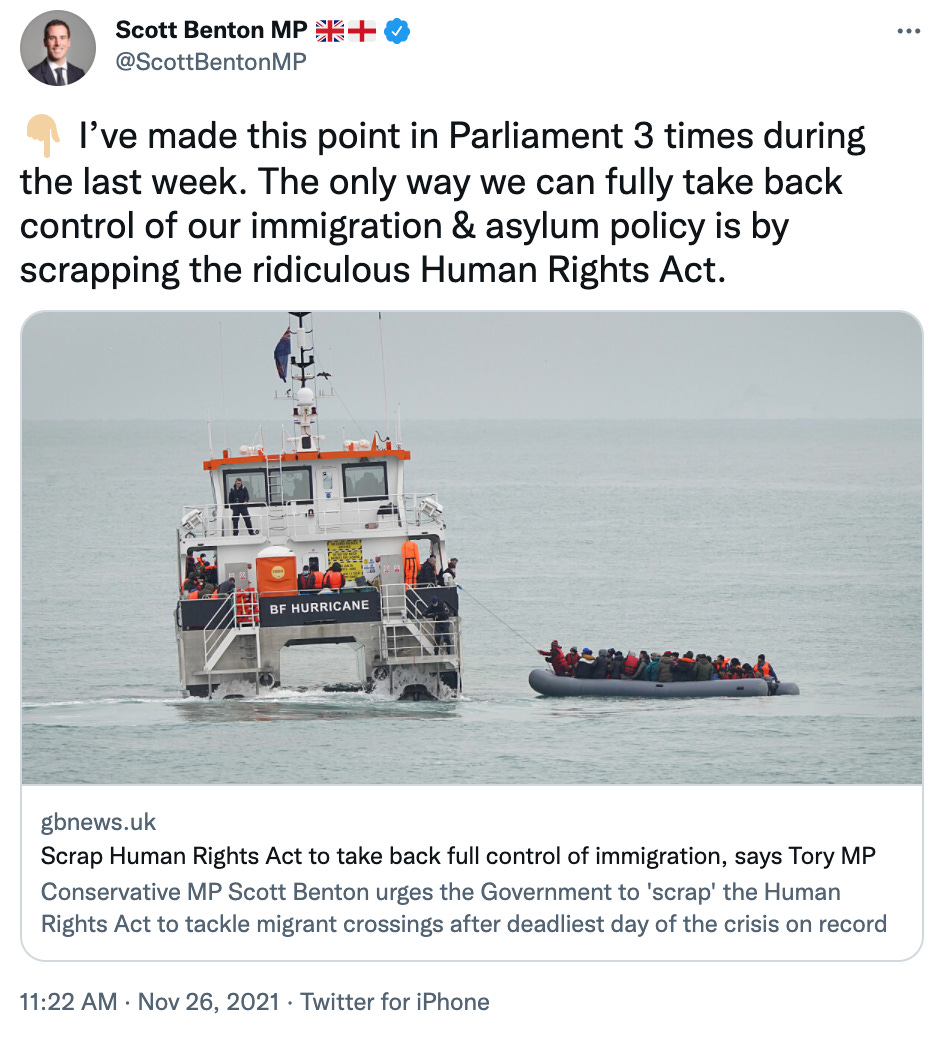'If they come for the Human Rights Act we're in a world of pain'
Journalist and author Paul Mason on why we ignore the threat of a 'second fascist era' at our peril
Welcome to Keeping the Receipts— a newsletter from the Citizens, this week written by Joanne O’Connor. You can read about the mission behind this here. If you like what you see, consider forwarding it to a friend or two. And if you’ve been reading it for free and want to support our mission, please consider signing up to the paid version.
This week MP Andrew Rosindell stood up in parliament and said that Britain will not be able to stop the “endless waves of illegal migrants” crossing the Channel until we “break free of the constraints of the European Convention of Human Rights”.
Rosindell was referring to the Tories’ pledge to replace the Human Rights Act, which enshrines the EHCR in domestic law, with a British ‘Bill of Rights’. It was the second time in the space of one week that a Tory MP rolled out the tired Brexit slogan of “taking back control” in support of scrapping human rights legislation:
The implication is that the ECHR is some pesky EU directive, like the supposed rule on bendy bananas, that we should no longer be subject to now that we’ve broken free of Brussels. The reality is that the Convention came into effect in 1953, long before the EU came into existence. The international treaty was signed in the wake of World War II by leaders who had witnessed firsthand the nightmare of a world in which millions of people had their basic human rights stripped away.
“If they come for the Human Rights Act we’re in a world of pain that we can’t anticipate,” said Paul Mason, journalist, broadcaster and seasoned anti-fascist campaigner. He has just written a book called How to Stop Fascism, because he’s concerned that if we don’t stop the rise of the far right, we could be facing a “second fascist era”.
We spoke to Paul about his new book, why ‘the new far right’ is on the rise and why modern-day fascists are different from their 20th century counterparts. Read on for our full interview and short film.
Q&A with Paul Mason, journalist, author and broadcaster
You’ve written a book called How to Stop Fascism. Why now?
The January 6th insurrection fomented by Trump, carried out by far right militias and backed by mobilised Republicans is, I think, going to be the signal moment of the 21st century. It is a perfect example of what will come again unless we stop the new far right. The far right are on the march everywhere, often using the shell of rightwing populist movements and parties and indeed anti-vax and conspiracy theory movements to work within.
People in Western democracies are kidding themselves if they think they're living in a stable, known and predictable world. A rightwing white supremacist became president of America and then tried to annul a democratic election. The president of Brazil rides on horseback, urging people to storm his own Supreme Court. Kabul fell in 48 hours. If that can happen, if Covid can happen, if we're on the brink of a major and prolonged climate crisis that affects everybody, then a second fascist era is possible. My book is about trying to alert people to that danger and to help them understand how virulent and attractive the new ideology of modern fascism is and how different it is to the fascism we were fighting in the eighties.
How does contemporary fascism differ from 20th century fascism?
In the Seventies, Eighties and early Nineties, I was an anti-fascist activist. That meant generally trying to stop the National Front and then the British National Party from parading down the streets and intimidating immigrant communities. They were organic fascists. Their dads, their granddads probably drank in pubs that had been Mosleyite pubs in the Thirties. They were white, they were skinheads, they hated migration, but they had a grip on reality. Today, what we're seeing is a much more networked, much more mercurial phenomenon. It's an ideology that's in people's heads. You don't even have to have had a fascist grandad. But what you do absolutely have to have is this penchant for illogicality, for ant-rationalism. They're not driven simply by prejudice. They have bought the idea of a theory, and this is the worrying thing.
What is the theory that they are buying into?
In the 2020s, we're facing a fascism that's been effectively regrown from its original philosophical roots, so it doesn't look the same as the old fascism. It is internationalist because it wants to destroy the whole world order, it is anti-modern because it wants to reverse out of 200 years of progress and science. It is networked, so don't expect a Hitler or a Mussolini to be leading it, although there are some people who would like to. It can lead itself. It co-creates its own ideology through social media. People write the Bible of new fascism in real time. In the recruitment channels for the new far right, violent misogyny and anti-feminism is just as important as racism. And I'm sorry to say, one of the biggest differences between the new and the old fascism is that this fascism is genocidal from the get-go. The modern far right are obsessed with genocide. They know how to do it. That it can be done at mass scale, industrially, in a way that early fascism in Italy and Germany didn't know. Those are the big differences.
Has the pandemic accelerated the rise of the far right?
Covid-19 has acted like a litmus test on every democracy, testing each country as to whether or not it has a coherent democratic culture. It's found out, for example, in the United Kingdom, that we have an ultra corrupt government that was doling out contracts, that was also prepared to go with the most extreme form of herd immunity...on the grounds that they didn't want to let anything get in the way of Brexit.
The deeper problem is that it also exposed the propensity of large numbers of people to believe bullshit because their lives are suddenly overturned. We've got violent, racist-led, anti-vax and anti-passport movements growing up all over Europe. In Vienna, they were carrying banners saying ‘No to the globalist filth’ and ‘Control your borders, not your people’. It’s a crystalline summary of how fascist ideologies are crossing over during the COVID pandemic into the minds of people who are just insecure, don't trust the state and never thought that they...would be part of a collective effort by humanity to defeat something bigger than even the nation state.
Isn’t it divisive to label people taking part in anti-vax marches as fascists?There are millions of people who are vaccine hesitant, and the danger is not that they are attracted to fascism. Fascism is attracted to them. Fascism colonises outrage and it colonises insecurity. It will do it on anti-Islam. It will do it on anti-trans. And it certainly does it on COVID vaccine hesitancy and anti-passport concerns. I have a few friends who are anti-vaxxers from the wellness community. What happens is that they end up being pushed into a world of explanations that they didn't go looking for. Does a global elite control the world? Did they invent this vaccine in order to be able to inject microchips into people's arms? They never thought about that, but suddenly they're surrounded by people who do. And out of the co-created conspiracy theory emerges a generally agreed ideology. And of course, that's not fascism. But it just so happens to resemble exactly the kind of psychological mass disturbance that the original sociologists of fascism observed in Germany in the late 1920s.
What role has social media played in the spread of far right conspiracy theories?
One of the reasons the new far right has grown so rapidly is that the answers to the crisis of 2008 capitalism and to the crisis of Western democracy found such a willing amplifier in the business models of social media and the tech platforms. They amplify any hatred, any anger, any outrage. Twitter has become the biggest disseminator of anti-semitism in history. Facebook is the biggest disseminator of disinformation and anti-science in history. YouTube vectors hate, outrage and disinformation towards young people who've got defenceless minds because they've not been educated to deal with it. We need to regulate those companies as if they were publishers. It's very simple. We make Facebook, Youtube, Twitter and the rest responsible for the content they produce.
Do you think there’s a complacency in the UK, a belief that what’s happening with the far right in America, Turkey or Brazil could never happen here?
The far right in Britain is dangerous but small. The bigger problem we have is that an alliance of rightwing populists and authoritarian Conservatives destroyed the very basis of 30 years of liberal capitalism in Britain. They destroyed our link to the European Union.
We're adrift in the world, geopolitically and economically, in a state of constant crisis, which is exactly where they want us to be. Constant uncertainty and now, having supposedly solved the problem through Brexit, they are advancing a series of anti-democratic laws.
First, they prorogued parliament. They lied to the Queen. They attacked the judiciary. And now they're coming for the Human Rights Act. If they come for the Human Rights Act and remove not just what was European law, but the summary of all human rights law that had ever existed in Britain, we're in a world of pain that we can't anticipate. So my number one worry right now is the decay and fragmentation of British democracy and the apparent lack of belief in it of people who would call themselves Conservatives.
What needs to happen to tackle the rise of the far right?
I think we're going to need to do three things. The first thing is at a political level, we're going to need an alliance of the centre and the left. The second thing is we need to have a militant democracy. This was a phrase used by [the German philosopher and political scientist] Karl Loewenstein in the Thirties, when he said the purpose of democracy is not to facilitate fascist parties, it should be to suppress them. And in some countries, Germany being the best example, there is an anti-fascist law that says if you have a party that looks and sounds fascist, then we put you under surveillance.
And the third thing is we need an anti-fascist ethos. My grandparents’ generation were proud that they defeated fascism in the war. We've got to have a language that isn't just about the far right, far left, anti-democracy. It's also about good and evil, because fascism was an unimaginable evil. And if it’s back, don't sit there using the old language or the old structures. Find some new way of counter-attacking it. Make it your mission.
How to Stop Fascism by Paul Mason is published by Penguin Books






Another chilling, more dire warning... These prescient scholars have been correct for the last 5 years. Their warnings keep coming true and their forecasts keep getting adjusted further...
I, sadly, appreciate the context of Jan 6 to the future, how it'll be milestone. That's a solid perspective.